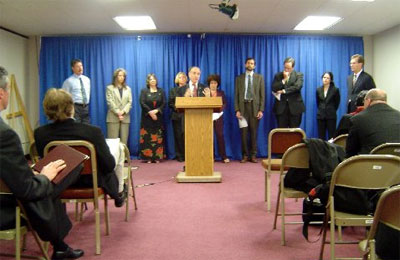Assemblyman Colton Announces Broad Support for Legislation Establishing Producer Responsibility for Electronic Equipment Recycling
Assemblyman William Colton, (D-47AD) Chair of the Assembly Legislative Commission on Solid Waste Management, announced broad support for the concept of holding electronic equipment manufacturers responsible for the recycling, reuse or remanufacture of their products. Colton stated: “This support is critical to achieving passage of legislation that requires manufacturers of electronic equipment to create or financially support programs for the recycling, reuse and remanufacture of their products. We must establish policy that requires waste electronic equipment to be responsibly managed, fostering their recovery to the greatest extent feasible through state and regional policies.”
Colton said, “Ideally electronic equipment recycling policy should be set at the federal level, but efforts to establish this policy have thus far failed. Therefore, I believe that states must take the initiative to create electronic equipment recovery programs.”
The Bensonhurst/Gravesend legislator acknowledged the presence of electronic equipment manufacturers at the press conference on Monday, April 23, stating, “I particularly want to thank those producers who have joined me today, thereby acknowledging their support of the concept that producers bear a responsibility for recycling the electronic equipment they produce. I also wish to thank the other stakeholders, including environmental groups, recyclers and retailers, who are attending the press conference, for their advocacy and support of the producer take-back philosophy.”
“133,000 personal computers are discarded each day in the United States, it’s time New York joined other states in implementing this common sense approach to a burgeoning hazardous waste problem that is harming people’s health here and around the world,” stated Kathy Curtis, Policy Director for Clean New York, a state-wide women’s environmental healthy advocacy group and said “We applaud Assemblyman Colton for championing extended producer responsibility for electronics.
Assemblymember Colton has been a leader in advocating producer responsibility for electronics recycling for a number of years and recently participated in a year-long regional effort spearheaded by the Council of State Governments/Eastern Regional Conference (CSG/ERC) and the Northeast Recycling Council (NERC) to develop a regional model for managing unwanted electronic equipment. Colton said that already a number of states have taken actions or have proposed legislation to manage electronics waste, including Maine, California, Maryland, and Washington State.
Mark Falconer of Hewlett Packard Government Affairs stated “Environmental responsibility is a priority at HP and we applaud Assemblyman Colton’s dedication to electronics recycling issues. Producer responsibility generates an incentive to design products that are easily recycled and keeps the marketplace competitive – thereby keeping the costs to consumers as low as possible.”
Donna Giliberto, General Counsel to the NYS Conference of Mayors and Municipal Officials said, “The time has come to make manufacturers responsible for the recovery of unwanted electronic equipment. Mandatory recycling has extended the life of municipal landfills by reducing the amount of solid disposed of at these sites, but the proliferation of outmoded electronic equipment and the failure to address its proper disposal could undermine the strides made by municipalities. The hazardous components in e-waste are finding their way into landfills and threatening drinking water supplies. NYCOM supports efforts to protect public health and ensure the high quality of drinking water in New York.
Michael McMahon, New York City Council Member, stated, “I am very much in favor of the concept of producer responsibility particularly as it applies to electronic equipment. New York City spends millions of dollars each year to dispose of electronic equipment that contains toxic components posing a public health and safety risk to our environment and which can be safely reused or recycled. I applaud Assemblymember Colton’s efforts to pass a statewide bill that will provide a big step toward creation of a sustainable society in New York.
“Electronic waste is the fastest growing sector of New York’s waste stream and contains valuable metals as well as environmental hazardous substances” said Marcia Bystryn, Executive Director of the New York League of Conservation Voters who added, “New York needs to take action to make electronics safer and encourage recycling. I applaud Assemblyman Colton’s leadership on this issue and look forward to working with him and the coalition assembled today to enact comprehensive and effect e-waste legislation.”
NYPIRG’s Laura Haight strongly supports the concept of “extended producer responsibility, “in which manufacturers are responsible for the cradle-to-grave impacts of the products they sell. One of the best working examples of this approach is New York’s bottle bill. Discarded electronic equipment poses special problems because of the hazardous components. It would become the producer’s responsibility not only to reduce the amount of waste generated, but also to protect us from toxic exposures. This voluntary approach will be greatly enhanced with the enactment of legislation that requires producers to be responsible for the costs of recycling electronic equipment.”
Assemblyman Colton noted that Governor Eliot Spitzer and the State Legislature agreed to add two new staff positions in the NYS Department of Environmental Conservation to specifically work on electronics recycling in the 2007-2008 budget recently passed in Albany. Assemblyman Colton believes that the public already supports the recovery of unwanted electronic equipment. Colton stated, “We have seen tremendous response to electronics collections days that have been held around the state, indicating that the public does not want to throw away this valuable equipment, but wants to see it reused and recycled.”
Electronic equipment from households, schools, offices and other facilities contain heavy metals such as lead, cadmium and mercury as well as other hazardous components or additives. Left to traditional disposal methods, these components can pose a significant threat to public health and the environment.

